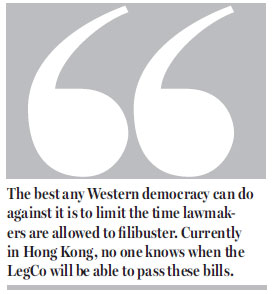Filibusters are a form of corruption
Updated: 2015-04-17 07:21
By Yan Ming(HK Edition)
|
|||||||
Yan Ming argues that filibustering is an abuse of power with a damaging effcet on politics
The Legislative Council (LegCo) began the second reading of the SAR government's budget funding bill on Wednesday. Unsurprisingly, some opposition lawmakers submitted thousands of nonsensical amendments to the budget funding bill. They have, of course, often done this in the past.
The budget funding bill covers infrastructure development projects and measures to help people financially - and normal government spending. As in the past, these politicians are not only trying to delay approval of the budget funding bill. They are also trying to pursue their own agenda through political extortion.
Widely known as filibustering, such tactics are common but unpopular in Western democracies. Indeed, many "leading democracies" have adopted legislative rules to limit lawmakers' ability to abuse "filibusters". It's a shame Hong Kong does not have the means yet to protect itself against unjustifiable filibustering by populist politicians such as Leung Kwok-hung, also known as "Long Hair". Leung has made a name for himself as one of the most prolific sponsors of "filibusters" in Hong Kong. By Tuesday, he had submitted more than 3,000 "amendments" to the budget funding bill.
Many political scientists around the world agree wanton filibustering is an unfortunate consequence of representative democracy. Politicians like filibustering when it helps them promote their personal agenda. The public cannot stop it because it is protected by the constitution. The best any Western democracy can do against it is to limit the time lawmakers are allowed to filibuster. Currently in Hong Kong, no one knows when the LegCo will be able to pass these bills. The public should let their legislative representatives know how they feel about unjustifiable filibustering.
"Power tends to corrupt and absolute power corrupts absolutely." This is one of the most widely quoted observations by 19th century British historian and writer Lord Acton. He was not the first person to make this observation. A slightly different version of this famous quote goes, "power corrupts, and absolute power corrupts absolutely." Both versions are often shortened into "absolute power corrupts absolutely". Some people wrongly assume only absolute power corrupts.
This misunderstanding must have been common. Numerous politicians routinely get away with abuses of power by unjustifiable filibustering. This is no doubt a form of corruption. It should be discouraged by law in the name of true democracy.
A similar misunderstanding of the term "corruption" also helps such abuses to go unpunished: That is that corruption always involves money and/or material gain (bribery and/or embezzlement). This misconception has been reinforced by anti-graft laws adopted around the world.
Hong Kong may not be a typical Western democracy, but it has also been a victim of such abuses. Clearly some elected representatives use their power given to them by voters to serve their personal interests at the expense of the city. The unjustifiable filibustering by Leung and his radical comrades clearly illustrates my point.
Some commentators have urged voters to punish these troublemakers by not voting for them in future - starting with the district council elections later this year and the next LegCo elections in 2016. I agree with this.
Unfortunately it is easier said than done due to the existing system of proportional representation. Indeed, the opposition parties have always denounced the current LegCo election system, characterized by the presence of functional constituencies. But don't think the angry rhetoric of the "pan-democrats" means they detest functional constituencies. The truth is this "undemocratic" electoral system has allowed them to win the last LegCo elections. Without it they could not have gained the critical minority they enjoy today. That is a tangible reason for the "pan-democrats" to prolong the existing LegCo election arrangements as opposed to one by universal suffrage - especially one that complies with the Basic Law and decisions by the National People's Congress Standing Committee.
It is well known that the chances of these opposition politicians winning LegCo elections by universal suffrage will be severely diminished. Particularly, when you consider what they have done to harm the public interest. The existing electoral system allowed some of them to be elected with as little as 10-20 percent of valid votes in their own constituencies in 2012.
If they allow the government's constitutional reform plans pass this time, Hong Kong residents will be able to choose the next Chief Executive with their own votes instead of having an Election Committee do it. According to the Basic Law, Hong Kong may be able to have universal suffrage in the 2020 LegCo elections if it succeeds in achieving it in the 2017 Chief Executive election. This means some opposition politicians may have their capacity to abuse power taken from them in around five years.
Having said this, I believe voters in Hong Kong should try to keep these lawmakers out of the LegCo next year - if only to show how much people detest their conduct.
The author is a current affairs commentator.

(HK Edition 04/17/2015 page12)